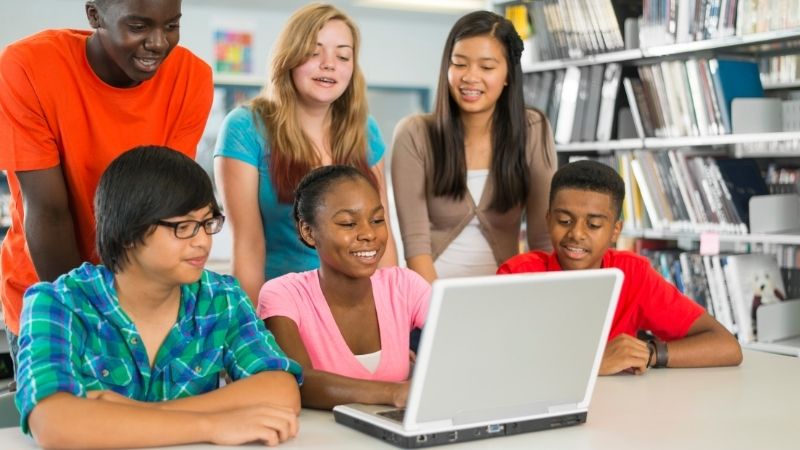
Over the past decade, there has been a significant rise in the use of educational games as a means of enhancing student learning outcomes. In particular, the integration of game elements, such as play and reward systems, has revolutionized traditional approaches to education.
This article explores the impact of educational games on learning outcomes, with a specific focus on learning through play, student engagement, reward systems, and educational quizzes.
By examining research findings and practical applications, this article aims to shed light on the promising future of gamified learning in education.
Key Takeaways
- Educational games and gamified learning enhance student motivation, engagement, and active participation in the learning process.
- Play-based learning promotes cognitive, social, and emotional development, as well as academic skills and critical thinking.
- Gamification strategies, such as reward systems and educational quizzes, increase student engagement and achievement.
- Reward systems and educational quizzes provide immediate feedback, promote ownership of learning, and enhance knowledge retention and understanding.
The Power of Educational Games
Educational games have been shown to have a significant impact on students' learning outcomes. The effectiveness of educational games lies in their ability to engage students and enhance the learning experience through gamification. Gamification involves incorporating game elements such as competition, rewards, and challenges into educational activities.
Research has demonstrated that when students participate in educational games, they are more motivated and actively involved in the learning process. This increased engagement leads to improved retention of information and enhanced critical thinking skills. Furthermore, the interactive nature of educational games allows for personalized learning experiences, catering to individual student needs and preferences.
Learning Through Play: A Revolutionary Approach
Effective play-based learning is a revolutionary approach that has gained significant attention in the field of education. This method recognizes the power of play in promoting children's cognitive, social, and emotional development. Research suggests that play-based learning not only enhances academic skills but also fosters creativity, problem-solving abilities, and critical thinking skills.
Moreover, play-based learning provides numerous benefits such as increased engagement, motivation, and enjoyment in the learning process.

Effective Play-Based Learning
Play-based learning has been shown to have a positive impact on students' cognitive development and academic achievement. This approach to education combines the benefits of playfulness and interactive learning, creating an engaging environment that promotes knowledge acquisition and skill development.
The following points highlight the effectiveness of play-based learning:
Increased student engagement:
Playful activities capture students' attention and foster active participation.
Interactive elements stimulate curiosity, motivation, and enthusiasm for learning.
Enhanced retention and understanding:
Play provides opportunities for hands-on exploration, enabling students to make connections between concepts.

It promotes meaningful interactions with content, leading to better comprehension and retention.
Benefits of Play?
The benefits of incorporating playful activities in the classroom environment extend beyond engagement and retention, supporting students' cognitive growth and academic success.
Play has long been recognized as an essential component of children's development, but its importance in education is often overlooked. Research suggests that play-based learning can enhance problem-solving skills, creativity, critical thinking, and social-emotional development.
By engaging in games and interactive activities, students are actively involved in their own learning process, leading to higher levels of motivation and enjoyment. Moreover, play allows for exploration and experimentation, promoting a deeper understanding of concepts.
Additionally, the use of gamified elements such as reward systems and educational quizzes can further enhance students' learning outcomes by providing immediate feedback and reinforcing positive behaviors.
Therefore, integrating play into the classroom setting is crucial for fostering holistic student development and optimizing academic achievement.
Enhancing Student Engagement Through Gamification
One approach to enhancing student engagement is through the implementation of gamification strategies in educational settings. Gamification refers to the use of game elements and mechanics in non-game contexts, such as education, with the aim of increasing motivation and interaction in learning processes. Research has shown that gamified activities can foster student motivation by creating an enjoyable and challenging learning environment.

Benefits of implementing gamification in education include:
- Increased student motivation: By incorporating elements like competition, achievements, and rewards, gamified activities tap into students' intrinsic motivation.
- Enhanced interactive learning: Gamification encourages active participation and collaboration among students, promoting a deeper understanding of concepts.
Practical examples of gamified strategies include:
- Reward systems: Offering virtual badges or points for completing tasks or achieving specific goals can incentivize students to actively engage with the content.
- Educational quizzes: Incorporating quizzes with immediate feedback not only reinforces learning but also adds an element of fun and excitement.
Overall, incorporating gamification strategies in educational settings can effectively enhance student engagement, motivation, and interactive learning experiences.
Unleashing the Potential of Reward Systems in Learning
Incorporating reward systems in educational contexts has the potential to unlock various benefits, such as increased motivation and active participation among learners.
Reward systems in online learning can be an effective tool for motivating students through rewards. Research suggests that using rewards can positively impact student engagement and achievement.
When students are rewarded for their efforts or achievements, they are more likely to feel a sense of accomplishment and satisfaction, which in turn increases their motivation to continue learning.
Moreover, reward systems provide immediate feedback, allowing students to understand the consequences of their actions and adjust their behaviors accordingly. This helps them develop a growth mindset and take ownership of their learning journey.

The Impact of Educational Quizzes on Learning Outcomes
This discussion aims to explore the impact of educational quizzes on learning outcomes, specifically focusing on three key points: quiz effectiveness on learning, engagement through educational quizzes, and assessing knowledge with quizzes.
Research has shown that implementing quizzes in educational settings can have a positive effect on learning by promoting active retrieval practice and enhancing knowledge retention.
Additionally, educational quizzes have been found to increase student engagement by creating an interactive and dynamic learning environment.
Moreover, quizzes serve as valuable tools for assessing students' knowledge acquisition and identifying areas that require further attention or improvement.
Quiz Effectiveness on Learning
The effectiveness of quizzes in promoting student learning outcomes has been a topic of interest in educational research. Quizzes serve as a valuable tool for assessing retention and reinforcing learned concepts. When designed appropriately, quizzes can enhance the learning experience by engaging students and promoting active recall.
Research suggests that short-answer or multiple-choice formats are effective quiz formats that encourage critical thinking and problem-solving skills. These quiz formats also allow for efficient grading and provide immediate feedback to students, aiding their understanding of the material.
Additionally, incorporating quizzes throughout a course promotes spaced repetition, which enhances long-term memory retention. Overall, well-designed quizzes can be an effective strategy to assess student learning and improve knowledge acquisition by encouraging engagement and active recall of information.

Engagement Through Educational Quizzes
One effective strategy for promoting engagement in educational settings is the use of quizzes. Quizzes provide an interactive learning experience that can captivate students' attention and encourage active participation. Research has shown that students are more likely to be engaged when they are actively involved in their own learning process, rather than passively receiving information.
By incorporating quizzes into the curriculum, educators can create opportunities for students to apply their knowledge, analyze information, and make connections between different concepts.
Quizzes also offer a form of immediate feedback, which can further enhance student engagement. When students receive feedback on their performance right away, they have the opportunity to reflect on their understanding and identify areas for improvement. This feedback loop promotes a sense of autonomy and control over one's learning, which are important factors in fostering engagement.
In addition to promoting engagement, quizzes can serve as a valuable tool for assessing knowledge. By assessing students' understanding through quizzes, educators can identify areas where additional instruction or support may be needed. This allows educators to tailor their teaching strategies to meet the specific needs of individual students.
Overall, incorporating quizzes as an engagement strategy in educational settings offers numerous benefits such as promoting active learning and providing immediate feedback. Assessing knowledge with quizzes allows educators to gain insights into students' understanding and address any gaps in learning effectively.
Assessing Knowledge With Quizzes?
Assessing knowledge through the use of quizzes provides educators with valuable insights into students' understanding and helps identify areas where additional instruction or support may be necessary. Quizzes, in their various formats, such as multiple choice, fill-in-the-blank, or short answer questions, serve as interactive assessments that engage students in active learning.
The benefits of using quiz format for assessment include:

- Immediate feedback: Students receive immediate feedback on their answers, allowing them to identify and correct misconceptions promptly.
- Reinforcement of learning: Interactive quizzes reinforce learning by providing opportunities for retrieval practice and review of key concepts.
- Diagnostic tool: Quizzes help educators assess individual student performance and tailor instruction based on specific needs.
By incorporating interactive assessments like quizzes into the teaching and learning process, educators can enhance student engagement and promote a deeper understanding of the subject matter.
This sets the stage for the subsequent section on gamified learning—a promising future for education that leverages elements of play to further enhance student outcomes.
Gamified Learning: A Promising Future for Education
Gamified learning holds significant potential as a future direction for education, providing an innovative approach to engage students and enhance their learning outcomes. This promising future of gamification in education is revolutionizing the traditional methods of teaching and learning.
By incorporating game elements such as challenges, competition, rewards, and feedback into educational activities, gamified learning creates a more engaging and interactive environment for students. Research has shown that this approach increases student motivation, enthusiasm, and participation in the learning process.
The use of educational games also helps students develop critical thinking skills, problem-solving abilities, and collaboration skills. Furthermore, the incorporation of reward systems in gamified learning can reinforce positive behaviors and encourage students to strive for academic success.
Overall, gamified learning has the potential to transform education by making it more enjoyable, effective, and impactful for learners.
Frequently Asked Questions
How Do Educational Games Impact Students' Cognitive Development?
The cognitive benefits of educational games are evident in their impact on students' cognitive development. The design of these games incorporates elements that enhance learning, such as problem-solving, critical thinking, and decision-making skills. Research suggests that educational games can improve students' cognitive abilities and contribute to their overall academic success.

Are There Any Studies That Show the Long-Term Effects of Learning Through Play?
Studies have shown the long-term effects of learning through play to be beneficial for cognitive development. Play-based learning promotes critical thinking, problem-solving skills, and creativity, leading to improved academic performance and overall educational outcomes.
What Are Some Effective Strategies for Enhancing Student Engagement Through Gamification?
Effective strategies for enhancing student engagement through gamification include incorporating elements of competition, providing immediate feedback and rewards, creating opportunities for active learning, and personalizing the learning experience to increase motivation and promote deeper understanding.
How Can Reward Systems Be Tailored to Individual Students' Learning Needs?
Personalized incentives and adaptive feedback can be tailored to individual students' learning needs by considering their unique strengths, weaknesses, and interests. This approach promotes motivation, engagement, and effective learning outcomes in educational settings.
Are There Any Specific Types of Educational Quizzes That Have Been Proven to Be More Effective in Improving Learning Outcomes?
Research has shown that different types of interactive quizzes can have varying impacts on students' learning outcomes. For instance, experiential learning quizzes, which involve hands-on activities and real-world scenarios, have been found to enhance understanding and retention of information.
 Careers in EducationElementary EducationHigh School EducationEducational TechnologyTeaching StrategiesSpecial EducationPrivacy PolicyTerms And Conditions
Careers in EducationElementary EducationHigh School EducationEducational TechnologyTeaching StrategiesSpecial EducationPrivacy PolicyTerms And Conditions
